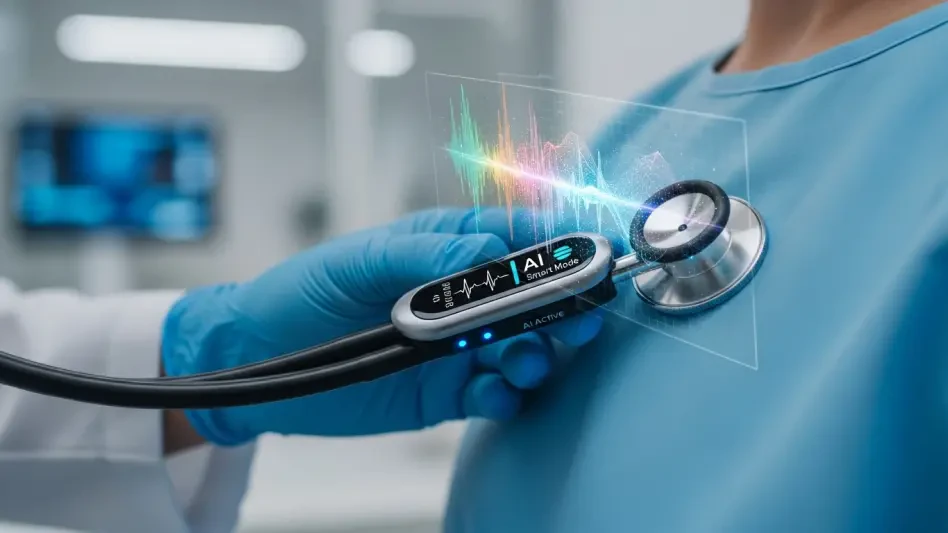Today, we’re thrilled to sit down with Faisal Zain, a renowned expert in healthcare technology with a deep focus on medical device innovation. With years of experience in designing and manufacturing cutting-edge diagnostic and treatment tools, Faisal has been at the forefront of transforming how medical professionals deliver care. In this conversation, we dive into the inspiration behind groundbreaking health tech, the role of AI in enhancing traditional medical tools, and the future of portable, intelligent devices in diverse clinical settings. We’ll also explore how these innovations balance efficiency with critical concerns like data security and patient privacy.
Can you share what drives your passion for innovating in the medical technology space, particularly with devices like smart stethoscopes?
My passion stems from a desire to bridge the gap between traditional medical practices and modern technology. I’ve always believed that tools like the stethoscope, which have been around for centuries, hold untapped potential for improvement. My background in medical device manufacturing gave me insight into how much time clinicians spend on administrative tasks rather than patient care. That motivated me to focus on solutions that not only enhance diagnostics but also streamline workflows, ultimately letting doctors focus on what matters most— their patients.
How does a smart stethoscope differ from the traditional one, and what impact does it have on a physician’s ability to diagnose conditions?
A smart stethoscope takes the core functionality of a traditional device and supercharges it with digital capabilities. It amplifies body sounds, filters out noise, and uses advanced sensors to capture data with incredible precision. What’s transformative is the integration of AI, which can analyze sounds in real-time to flag potential issues like heart murmurs or abnormal lung sounds during an exam. This means doctors get immediate insights, often catching subtle signs of disease that might be missed otherwise, leading to faster and more accurate diagnoses.
One fascinating feature of modern health tech is the ability to act as an AI medical scribe. Can you walk us through how this works in a clinical setting?
Absolutely. Devices with AI scribe capabilities can listen to and transcribe conversations between doctors and patients in real-time. Using ambient sound capture, the technology processes dialogue and automatically generates clinical notes, formatted into standard templates like SOAP notes. Physicians can review and edit these notes through a web application before they’re integrated into electronic health records. This cuts down hours of paperwork, allowing doctors to spend more time engaging with patients rather than typing up reports.
With such advanced data capture, how do you address the critical issue of protecting patient privacy and securing medical information?
Privacy is non-negotiable in healthcare. We ensure data security through robust encryption and compliance with standards like HIPAA. Every piece of information, whether it’s a recorded conversation or diagnostic data, is protected with top-tier security protocols. Additionally, we’re transparent about how ambient sound is captured and used, addressing concerns by giving doctors control over recordings and ensuring patients are informed. It’s about building trust while delivering innovation.
Many of these smart devices are designed to be portable. How does this flexibility enhance their use across different medical environments?
Portability is a game-changer. A compact, wireless device can be used seamlessly during hospital rounds, in clinic exam rooms, or even in emergency settings like ambulances. It’s designed to go wherever care is needed, ensuring that doctors have access to advanced diagnostics and documentation tools without being tied to a desk or heavy equipment. This adaptability not only improves efficiency but also democratizes access to cutting-edge technology for healthcare providers in varied settings.
Looking at the integration of AI, how do you see this technology evolving to provide even deeper insights beyond diagnostics and documentation?
I believe we’re just scratching the surface with AI in medical devices. Beyond diagnostics and scribing, there’s potential to analyze voice characteristics for biomarkers—think stress levels or early signs of neurological conditions. We’re also exploring adding more non-invasive sensors to capture vital signs, creating a more holistic picture of a patient’s health in real-time. The goal is to make these tools not just assistants but comprehensive interfaces for AI-driven healthcare solutions.
What is your forecast for the role of AI-powered medical devices in shaping the future of healthcare delivery?
I’m incredibly optimistic. AI-powered devices will become the backbone of healthcare infrastructure, acting as interfaces that connect various technologies and providers. They’ll standardize how data is captured and shared, reducing inefficiencies and disparities in care. Over the next decade, I foresee these tools becoming as ubiquitous as smartphones, with open ecosystems that allow seamless integration of third-party innovations. Ultimately, they’ll empower clinicians to deliver personalized, proactive care on a scale we’ve never seen before.









